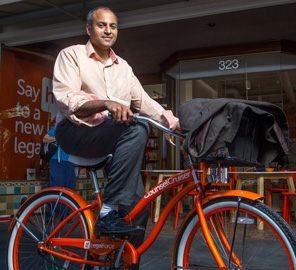UpCounsel website for freelance lawyers shuts down after litigation opponent becomes 'significant shareholder'

Image from Shutterstock.com.
An online marketplace that links freelance lawyers with small businesses and other would-be clients has announced it is shutting down March 4.
UpCounsel did not provide a reason for the decision in an announcement sent to users and posted on its website, report LawSites, Bloomberg Law and Law360. The decision was made by the company’s board of directors and shareholders.
The announcement comes about a year after a litigation opponent obtained the right to buy “a significant number of shares in UpCounsel” in an apparent settlement of a lawsuit. Federal court records revealed the stock agreement.
The lawsuit against UpCounsel had alleged false advertising and unfair competition by UpCounsel. The plaintiff was patent and trademark law firm LegalForce RAPC.
LegalForce RAPC’s founder and CEO Raj Abhyanker tells the ABA Journal that he has become a “significant shareholder” in UpCounsel. (Abhyanker was named an ABA Journal Legal Rebel in 2013).
 Raj Abhyanker. Photo by Tony Avelar/ABA Journal.
Raj Abhyanker. Photo by Tony Avelar/ABA Journal.
Abhyanker says UpCounsel needs “retooling to be compliant with the law,” but he doesn’t think people have seen the last of the company.
“I don’t think I’m content with UpCounsel just going off into the sunset,” Abhyanker tells the ABA Journal. “My plan and my hope is that we will retool it and bring it back in a form that will allow it to continue thriving and doing the good work that it does.”
Abhyanker obtained his stake in the company in a settlement reached after a federal judge “threw a scare” into UpCounsel by rejecting part of its motion to dismiss Abhyanker’s suit, Abhyanker said in a previous blog post.
U.S. District Judge Yvonne Gonzalez Rogers of Oakland, California, allowed some of Abhyanker’s claims and dismissed others in her January 2019 decision, covered by Law360.
Rogers allowed claims in which Abhyanker alleged:
• UpCounsel manipulates search engine results to display fabricated ratings for its lawyers.
• UpCounsel misrepresents its fee structure.
• UpCounsel “brazenly ignored law, ethics, and common sense in defiance of healthy competition.”
Rogers had tossed an unfair advertising claim relating to UpCounsel’s assertion that it was the “world’s largest virtual law firm.” She also tossed a claim that UpCounsel was operating as a lawyer referral service that is not generally allowed under California’s ethics code.
 UpCounsel co-founders Mason Blake (left) and Matthew Faustman. Photo courtesy of UpCounsel.
UpCounsel co-founders Mason Blake (left) and Matthew Faustman. Photo courtesy of UpCounsel.
Abhyanker referred to his allegations about unfair competition and fake star ratings in his interview with the ABA Journal. Asked whether UpCounsel’s founders are still involved with the company, Abhyanker said their conduct led to the situation today.
“I don’t think I want them involved in the company any more,” Abhyanker says. “I hope they are not moving forward, but it is not completely my decision.”
“This isn’t the last you will hear of UpCounsel,” Abhyanker adds. “I think UpCounsel has a bright future ahead. I think the regulatory framework will allow that to happen.”



